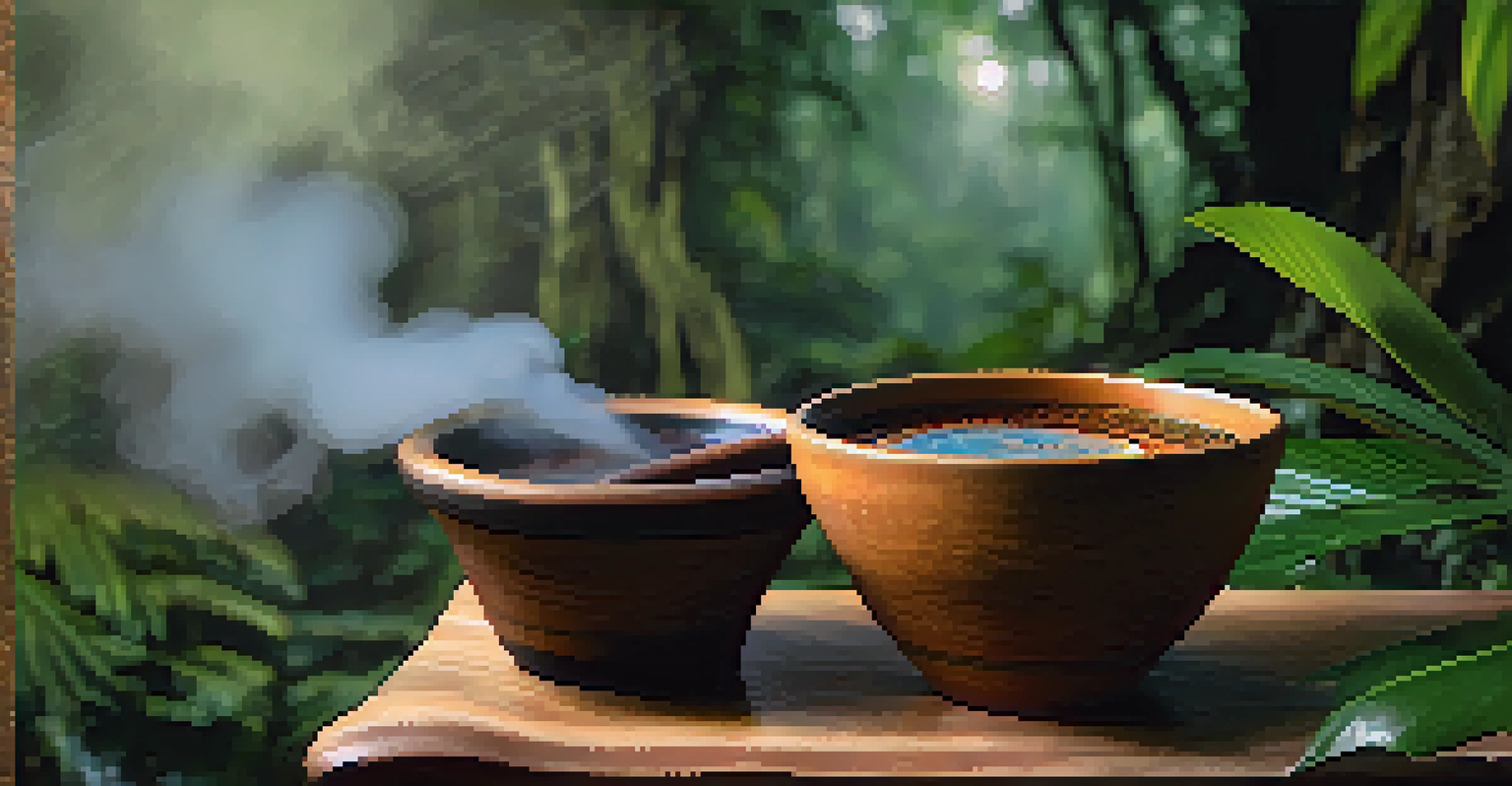The Growth of Ayahuasca Tourism: Trends and Future Prospects

Understanding Ayahuasca: A Brief Overview
Ayahuasca is a traditional brew made from the Banisteriopsis caapi vine and other plant ingredients, primarily used in spiritual ceremonies by Indigenous people in the Amazon basin. This powerful concoction is known for its psychoactive properties, primarily due to the presence of DMT (dimethyltryptamine). Many seekers turn to Ayahuasca for healing, self-discovery, and spiritual awakening, often in a guided setting.
Ayahuasca is not a drug; it is a teacher. It is a means of connecting with the divine and a way to heal the wounds of the soul.
The growing interest in mental health and alternative therapies has put Ayahuasca in the spotlight, attracting individuals from all walks of life. As more people seek holistic solutions, Ayahuasca offers a unique experience that is both profound and transformative. This surge in interest has paved the way for Ayahuasca tourism, where travelers venture to the Amazon for guided ceremonies.
Related Resource
While the experience can be deeply personal and enlightening, it’s essential to approach it with respect and caution. Understanding the cultural significance and proper context is crucial for anyone considering participating in an Ayahuasca ceremony.
The Surge in Ayahuasca Tourism
In recent years, Ayahuasca tourism has seen a remarkable surge, with travelers flocking to South America, particularly Peru and Brazil. The allure of profound personal insights and healing has drawn not only spiritual seekers but also those grappling with issues like depression and PTSD. This trend has transformed small villages into booming hubs for wellness tourism.

Many retreat centers have emerged, offering structured programs that include ceremonies, integration sessions, and holistic healing practices. These centers often employ experienced shamans to facilitate the ceremonies, ensuring that participants are guided safely through their journeys. This professionalization of the experience has made Ayahuasca more accessible to a global audience.
Ayahuasca's Cultural Importance
Respecting the cultural roots of Ayahuasca is crucial for ethical participation in ceremonies.
However, with this growth comes challenges, including the risk of commercialization and cultural appropriation. It’s vital for travelers to choose retreats that honor the traditions and practices of Indigenous cultures, ensuring that the experience is respectful and authentic.
Cultural Significance and Ethical Considerations
Ayahuasca has deep roots in Indigenous cultures, where it has been used for centuries for spiritual and medicinal purposes. As tourism increases, there’s a growing concern about the potential exploitation of these traditions and the communities that uphold them. Ethical considerations are paramount, as it’s crucial to respect the cultural heritage tied to Ayahuasca use.
We must respect the traditions and cultures that have safeguarded Ayahuasca for centuries, ensuring that its use is ethical and responsible.
Tourists must educate themselves about the historical and cultural context of Ayahuasca before participating in ceremonies. This understanding not only fosters respect but also enhances the overall experience. Engaging with the local community and supporting their initiatives can help bridge the gap between tourists and Indigenous cultures.
Related Resource
Moreover, ethical tourism practices encourage sustainable engagement, ensuring that profits benefit local communities rather than exploit them. By prioritizing ethical considerations, travelers can contribute positively to the preservation of cultural heritage.
Mental Health and the Ayahuasca Experience
Many individuals seek Ayahuasca for its potential mental health benefits, including relief from anxiety, depression, and addiction. Research suggests that the psychedelic experience can lead to profound shifts in perspective and emotional healing. Participants often report significant breakthroughs during and after their journeys, attributing these changes to the Ayahuasca experience.
Integration, the process of applying insights gained during the ceremony to daily life, is a crucial component of the healing journey. Many retreat centers offer support through counseling and group discussions, helping individuals navigate the challenges that arise post-ceremony. This support is essential for maximizing the therapeutic benefits of the experience.
Mental Health Benefits Explored
Many individuals seek Ayahuasca for its potential to alleviate mental health issues like anxiety and depression.
While many find Ayahuasca beneficial, it’s important to approach it with caution, as it may not be suitable for everyone. Consulting with mental health professionals and doing thorough research can help individuals make informed decisions about their participation.
Trends in Ayahuasca Retreats and Experiences
The landscape of Ayahuasca tourism is continually evolving, with new trends emerging as demand grows. Many retreats are beginning to incorporate additional wellness practices such as yoga, meditation, and nutritional guidance, creating holistic packages that cater to diverse needs. This fusion of practices enhances the overall retreat experience, attracting a broader audience.
Moreover, there's a noticeable shift towards more personalized experiences, with smaller group sizes and individualized attention becoming the norm. This trend allows for deeper connections between participants and facilitators, fostering a sense of community and support. The rise of online platforms has also made it easier for travelers to find retreats that align with their specific intentions and values.
Related Resource
As the industry grows, it’s likely that we’ll see an increase in regulations and standards to ensure safety and ethical practices. This evolution can lead to a more responsible and sustainable approach to Ayahuasca tourism, benefiting both participants and local communities.
The Future of Ayahuasca Tourism
Looking ahead, the future of Ayahuasca tourism seems promising, yet it requires careful navigation. As more people seek alternative healing modalities, the demand for authentic Ayahuasca experiences will likely continue to rise. However, this growth must be balanced with a commitment to ethical practices and cultural respect.
Innovative approaches, such as virtual integration support and community-driven retreats, may shape the next phase of Ayahuasca tourism. These developments can help ensure that the benefits of Ayahuasca reach a wider audience while maintaining the integrity of traditional practices. The emphasis will likely remain on creating safe environments that prioritize well-being and respect.
Growth of Ayahuasca Tourism
The rise in Ayahuasca tourism has led to both opportunities for healing and challenges related to commercialization.
Ultimately, the future hinges on how well the tourism industry can adapt to changing demands while honoring the cultural significance of Ayahuasca. By fostering collaboration between travelers, facilitators, and Indigenous communities, we can create a sustainable model for Ayahuasca tourism that respects its roots.
Embracing Ayahuasca with Respect and Awareness
As interest in Ayahuasca tourism continues to grow, it’s essential for travelers to approach their journey with respect and awareness. Doing thorough research on retreat centers, facilitators, and cultural backgrounds can help ensure a meaningful experience. Engaging with local communities and supporting their traditions is a vital aspect of responsible tourism.
Awareness of the potential risks associated with Ayahuasca is also crucial. Understanding the psychological impacts, possible contraindications, and legal considerations will prepare participants for a safe journey. It’s important to prioritize personal well-being and mental health when considering such a profound experience.

Ultimately, embracing Ayahuasca tourism with an open heart and a respectful mindset can lead to transformative journeys that honor both individual growth and the rich traditions of Indigenous cultures.